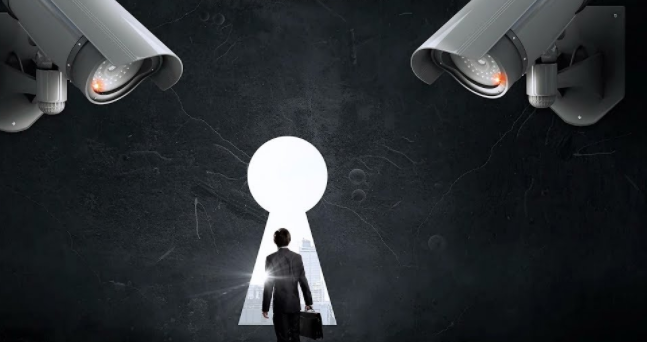(单词翻译:单击)
Ever feel someone watching you?
有没有感觉到有人在看着你?
Like, you just know they're staring, even if you're not looking at them?
比如,即使不看他们,你也知道他们在盯着你?
It's not some psychic sense, as cool as that would be.
这并不是精神上的感觉,实际情况就是这样。
Psychology researchers call it gaze detection—your ability to recognize where a person or animal is looking.
心理学研究人员称之为眼球侦测——识别人或动物在看什么的能力。
And even though we don't have all the answers about how it works in humans, science has provided some pretty good evidence as to what's going on in your brain.
尽管我们还不知道它是如何在人类身上起作用的,但是对于大脑发生的事有科学依据。
Various studies suggest that gaze is processed preferentially by the brain,
多项研究表明,注视优先由大脑处理,
meaning it's processed faster and more accurately than some other kinds of stimuli.
这意味着注视比其他刺激物处理起来更快更准确。
Especially when it's on you, which is called direct gaze.
尤其当目光在你身上的时候,这被称为直视。
Your brain has a pretty big network of areas that handle different aspects of getting information from faces.
人脑有一个很大的区域网络,该网络处理面部来自不同方向的信息。
Like, there are regions that respond to shape, orientation, or specific features. That sort of thing.
例如,有些区域会对形状、方向或特定特征做出反应,诸如此类的事情。
And when it comes to gaze detection, scientists believe an area in this network called the Superior Temporal Sulcus, or STS, is responsible for telling you exactly where someone else is looking.
当涉及到眼球侦测时,科学家们认为,这个网络中一个叫做颞上沟的区域负责告诉你到底其他人在看哪里。
Studies looking at a comparable area in the temporal lobe of macaque monkeys found cells that are tuned to the orientation of both the head and gaze direction.
研究人员对猕猴颞叶的一个类似区域进行了观察,发现这些细胞与头部和视线方向有关。
For instance, one study from 1985 had macaque monkeys look at faces of other macaques.
例如,1985年的一项研究让猕猴看其他猕猴的脸。
And they found that 63% of the 182 cells that were probed fired in response to changes in head direction.
他们发现182个细胞中63%的细胞会对头部方向的改变做出反应。
More than half of that 63% also responded to changes in gaze direction, and a few responded to direct gaze.
63%的细胞中超过一半的细胞对眼球方向的变化做出反应,少数人对直接注视反应。
Researchers assume the Superior Temporal Sulcus works similarly in humans, since performing the same sort of experiments in living humans is too invasive.
研究人员假设颞上沟在人类身上也有类似的效果,因为在活人身上做同样的实验太残忍了。
Now, it's easy enough for your brain to figure out where a gaze is pointed when you're looking right at someone.
现在,当你直视某人的时候,你的大脑很容易就能判断出注视的方向。
But what about that feeling of being watched when you can't see someone's eyes clearly?
但是,当你看不清楚别人的眼睛时,被注视的感觉又如何呢?
In your peripheral vision, the resolution becomes low enough that details are harder to see—like, where someone's pupils are with respect to the whites of their eyes.
在你的周边视线中,分辨率足够低以至于很难看到细节——比如一个人的瞳孔相对于眼白的位置。
In this situation, your brain starts to take head orientation as evidence of direct gaze instead.
在这种情况下,你的大脑开始把头部的方向作为直接注视的依据。
Researchers studying this in 2015 tested how well participants could identify the gaze direction of faces with different orientations presented at different eccentricities.
2015年,研究人员对这一问题进行了研究,测试了在不同偏心度和脸部朝不同方向的情况下,参与者对于注视方向的识别能力。
They had participants stare straight ahead, so a face straight ahead would be 0 degrees eccentricity,
他们让参与者直视前方,所以面视前方时,偏心度为0,
and in line with their shoulders would be plus and minus 90 degrees eccentricity.
肩膀方向的偏心度为正负90度。
And they generally found people could accurately tell where a gaze was directed up to 6 degrees eccentricity.
研究人员发现,人们通常能够准确地判断偏心度为6的注视方向。
Which isn't that much before we kind of start to suck at it.
在我们开始之前,这个偏心度还不算大。
Overall, gaze discrimination got less accurate farther away from zero degrees.
总的来说,偏心度越大,目光辨别的准确率会降低。
Which makes sense, because farther from zero degrees means more blurry peripheral vision.
这是有道理的,因为距离零度越远,周边的视线就越模糊。
As details of eyes became less clear, participants relied more on head orientation to figure gaze out.
视线不那么清晰的时候,参与者更多地依赖头部方向来判断注视方向。

This swayed their answers, and wasn't always accurate.
这影响了他们的回答,而且并不总是准确的。
This and the results of a similar study from 2015 showed that if faces in the periphery were pointed right at participants,
这项研究和2015年的一项类似研究的结果表明,如果周边视线正好对着参与者,
they were more likely to assume it was a direct gaze.
他们很有可能认为那是直视。
So, basically, if someone just out of your line of sight is facing you, your brain assumes they're looking right at you.
所以,基本上来说,如果你视线之外的人正对着你,大脑就会认为他们正盯着你。
If their head is turned, you're more likely to assume they're not looking at you, no matter where they're actually looking.
如果他们转过头,你更有可能认为他们没有在看你,不管他们实际上在看哪里。
And as for the spooky feeling of “that person behind me is looking at me, I can feel it" thing, there is an explanation for that too.
至于“我能感觉到我身后的那个人看着我”这种诡异的感觉,也有一个解释。
Even though nobody actually has eyes in the backs of their heads.
即使人的后脑勺上没有眼睛。
Turns out, we might just tend to assume people are looking at us. All the time.
事实证明,我们可能只是倾向于假设人们在看着我们。无时无刻。
In research from 2013, scientists showed participants a series of faces and eyes under different levels of noise filter that basically made them look blurry.
在2013年的一项研究中,科学家向参与者展示了一系列的面孔和眼睛,被置于不同色阶的静噪滤波器下的面孔和眼睛看起来很模糊。
Some were really clear, which made it easier to read the gaze.
有些是非常清晰的,这样辨别注视的时候会更容易。
And others were pretty obstructed, so they were less easy to guess at.
其他的都被挡住了,就比较难猜了。
The researchers asked participants to judge whether or not the faces were looking at them.
研究人员让参与者判断这些脸是否在看着他们。
And they found that in trials where the faces and eyes were obstructed by noise, participants were more likely to perceive the gaze as directed at them.
他们发现,在那些脸和眼睛被静噪滤波器干扰的实验中,参与者更有可能感知到他们直视的目光。
In real life, the scientists took this to mean that in situations where you can't know where people are looking—
在现实生活中,科学家们认为,这意味着在你不知道人们看哪里的情况下
like when it's dark, someone's behind you, or they're wearing sunglasses—your brain is automatically making you feel watched.
比如天黑的时候,有人在你身后,或者他们戴着墨镜——大脑会自动让你有种被监视的感觉。
And I mean, come on brain!
我是说,加油,大脑!
We're interesting, but not enough to be watched all day, every day, by everyone whose eyes we can't see.
虽然我们很有趣,但还不足以让我们整天、每天都被那些我们看不见的人注视。
It might sound like sort of a silly assumption if I put it that way.
我这么说,听起来可能有点傻。
But evolutionarily speaking, knowing when someone or something is looking at you could be really important.
但从进化的角度来说,知道某人或某事什么时候看着你真的很重要。
They might be planning to attack, so it's best to be on guard.
他们可能正计划进攻,所以保持警惕是最好的方法。
Besides that, knowing if you're being watched also lets you interact socially.
除此之外,知道自己是否被监视也能让你互动社交。
If someone wants your attention, whether it's your friend or your baby,
如果有人想引起你的注意,不管是你的朋友还是你的孩子,
it's way easier to notice if you're already unconsciously scanning for people looking at you.
如果你已经在无意识地扫描看你的人,你就更容易注意到他们。
So sorry, you're not psychic.
抱歉,你不是巫师。
You just have a solid and comprehensive and well-designed gaze detection system.
你只是拥有一个牢固、全面、设计精良的眼球侦测系统。
And that's just as cool, right?
这也很酷,对吧?
Thanks for learning with us here on SciShow Psych,
感谢您在心理科学秀节目中与我们一起学习,
and thanks especially to our patrons on Patreon whose support makes all these videos possible.
特别感谢Patreon对本节目的支持。
If you want to join our community, you can go to patreon.com/scishow.
如果你想加入我们的社区,你可以登陆patreon.com/scishow。
Or share this video with your friend who swears that he has a spidey sense for being watched.
或者和你有被监视感觉的朋友分享这个视频。


